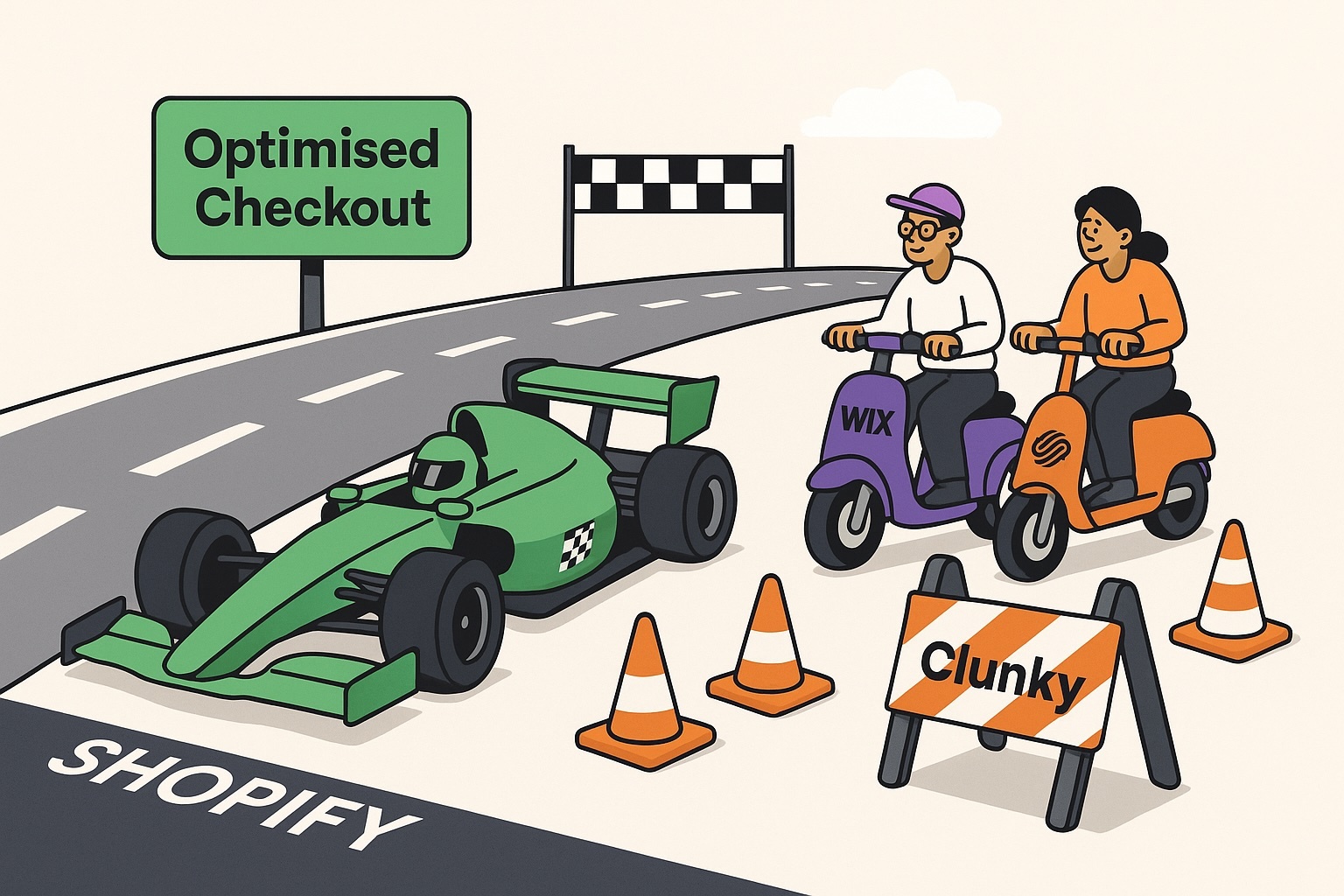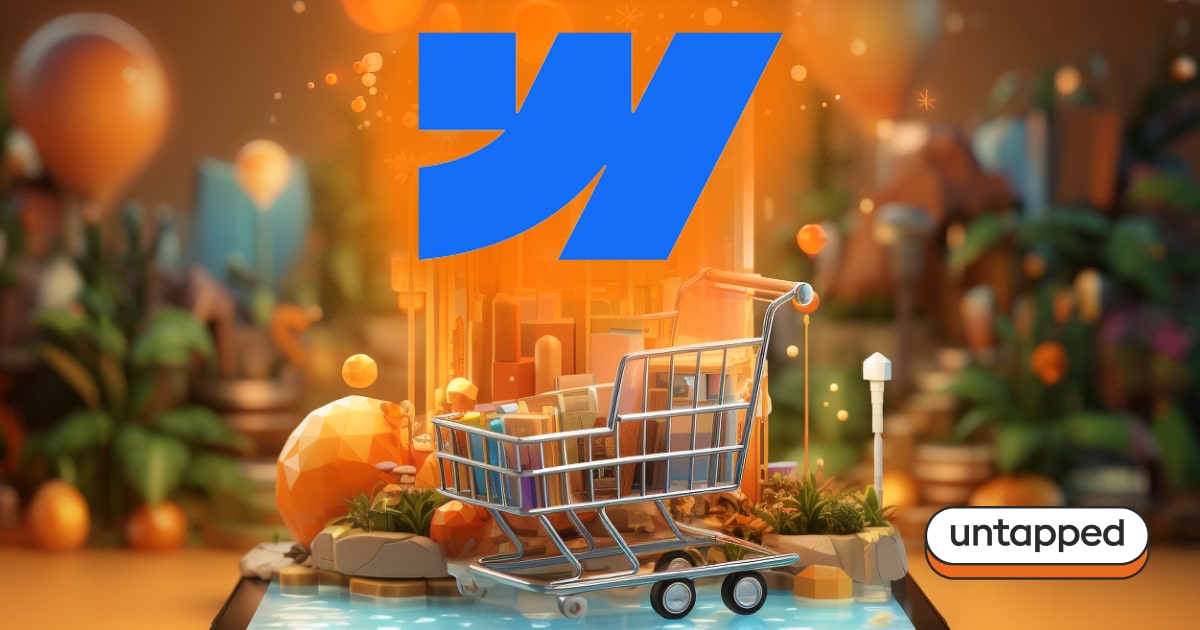Wix and Squarespace might look like quick wins. They’re easy to start with, they look decent out of the box, and they offer some basic selling tools. But once you start growing or need flexibility, that’s when the cracks start to show.
Shopify, on the other hand, is purpose-built for e-commerce. It removes the limitations that hold back Wix and Squarespace users and gives you the tools you need to sell more, manage your business better, and create a faster, smoother customer experience.
Let’s break it down.
1. Built for E-commerce, Not Just a Website With a Cart
Wix and Squarespace:
These platforms are website builders first. Their e-commerce features are add-ons, not core functions. If you’re running a basic store with a handful of products and you don’t care much about conversion rates or scaling up, they can work. But once you want more advanced functionality, customisation, or integrations, you start hitting walls.
Shopify:
From product setup to checkout to abandoned cart recovery, everything on Shopify is designed with selling in mind. Shopify’s checkout is the highest-converting on the internet. You get robust inventory tools, detailed customer insights, and native tools to manage discounts, gift cards, subscriptions, and more.
2. Flexibility Without Hacking It
Wix and Squarespace:
Customisation is limited. You’re often locked into fixed templates or forced to use workarounds to achieve what should be basic e-commerce functionality. Want to integrate third-party apps, tweak how your checkout works, or offer complex shipping rates? Be prepared to jump through hoops, or worse, be told it’s “not supported.”
Shopify:
You can build what you want, how you want. There’s a huge app ecosystem, but if you want something bespoke, Shopify’s theme and Liquid templating system makes it possible. Developers love it for that reason. And if you’re not technical, Shopify Partners (like us) can create exactly what you need without breaking your store.
3. Speed and Scalability
Wix and Squarespace:
As your store grows, load times slow down and page performance takes a hit. These platforms are not optimised for high-traffic or high-volume e-commerce. Sites with lots of product pages or rich content can quickly become sluggish.
Shopify:
Speed is a priority. Your site is hosted on a global CDN with rock-solid infrastructure. Shopify powers over 4 million stores worldwide, including big brands like Gymshark, Glossier, and Allbirds. Whether you’re doing 10 orders a day or 10,000, it doesn’t break a sweat.
4. SEO That Actually Works
Wix and Squarespace:
They’ve improved over the years, but SEO on these platforms still lacks depth. Control over page structure, redirects, meta fields, and schema markup is limited. If you rely on organic search traffic to grow, you’re at a disadvantage.
Shopify:
You get clean URLs, fast load times, and full control over SEO settings. Shopify supports rich schema for product listings, handles canonical URLs properly, and offers built-in blogging tools for content marketing. For serious SEO campaigns, Shopify is miles ahead.
5. Payment Flexibility and Lower Transaction Fees
Wix and Squarespace:
You’re often tied to their own payment systems or pay higher transaction fees when using third-party gateways. Limited support for multi-currency and more advanced payment flows can also be a blocker if you’re looking to scale internationally.
Shopify:
You can use Shopify Payments (which removes extra transaction fees) or integrate with over 100 payment providers globally. Want to offer Buy Now, Pay Later, local payment methods, or crypto? All possible with Shopify.
6. Advanced Features You’ll Actually Need
Abandoned cart recovery:
Wix and Squarespace offer limited automation and lack depth in their recovery flows. Shopify’s built-in tools are smarter, and you can upgrade to Klaviyo or similar tools easily.
Shipping and fulfilment:
Shopify supports real-time shipping rates, multiple fulfilment locations, integrated label printing, and more. Wix and Squarespace are basic in comparison.
Multi-channel selling:
Shopify connects with Instagram, TikTok, Amazon, Etsy, eBay, and more. Your inventory stays in sync, your data is centralised, and your marketing is easier to manage.
7. Support and Community
Wix and Squarespace:
Support is available, but usually limited to basic troubleshooting. Advanced e-commerce support? Not their strength.
Shopify:
You get 24/7 support and access to a massive ecosystem of experts, developers, designers, and app creators. Plus, there’s a huge knowledge base and user community to help you grow.
8. The Power of the Shopify App Store
Shopify’s app store is unmatched. Whether you want to launch a loyalty program, set up a subscription service, run powerful analytics, or add upsells, there’s an app for it.
Wix and Squarespace offer far fewer integrations. You’re often stuck with a small set of approved tools or forced to use awkward workarounds.
Where does that leave you?
Wix and Squarespace have their place. They’re decent for portfolios, blogs, or small brochure sites. But if you’re serious about e-commerce, Shopify gives you the tools to succeed from day one, and the flexibility to keep growing without needing to replatform later.
You’ll sell more. You’ll spend less time fighting limitations. And you’ll build a better experience for your customers.
FAQs
Is Shopify more expensive than Wix or Squarespace?
At first glance, yes but in reality no. Plans start from £19 per month. But consider what you’re getting. With Shopify, you’re investing in a platform built to grow with you. You won’t need to upgrade or rebuild your store later, and the improved conversion rates, better SEO, and streamlined workflows more than make up for the price.
Can I migrate from Wix or Squarespace to Shopify?
Yes. You can move your products, customer data, and content over with a structured migration process. Agencies and Shopify Experts can handle this for you to make sure nothing is lost and your new store is optimised from day one.
Do I need a developer to use Shopify?
No. Shopify is user-friendly and comes with excellent templates you can customise easily. But if you want something custom or more advanced, it’s good to work with a Shopify Partner or developer who knows the ecosystem well.
Is Shopify good for SEO?
Yes. Shopify has excellent built-in SEO tools and is optimised for performance and indexing. You can also add apps or use third-party tools to extend your SEO even further.
Which platform is best for mobile shopping?
Shopify. Mobile-first design, lightning-fast load times, and a mobile-optimised checkout all come as standard. You can preview and control the mobile experience in detail, which is key for converting on mobile.
If you’re looking to move away from Wix or Squarespace, or you’re launching a new store and want to set yourself up for success, Shopify is the clear choice. We’ve helped brands at every stage of the journey make the switch and grow faster than they thought possible.
Ready to get started? Let’s talk.




-min.jpg)




Any thoughts?
Leave a comment